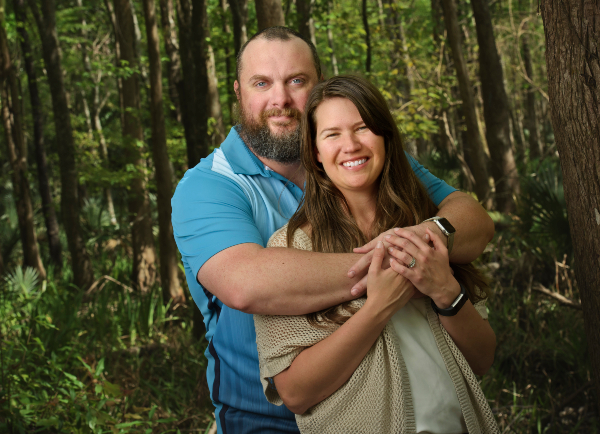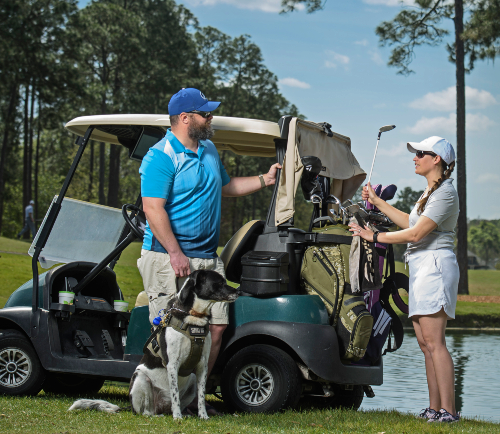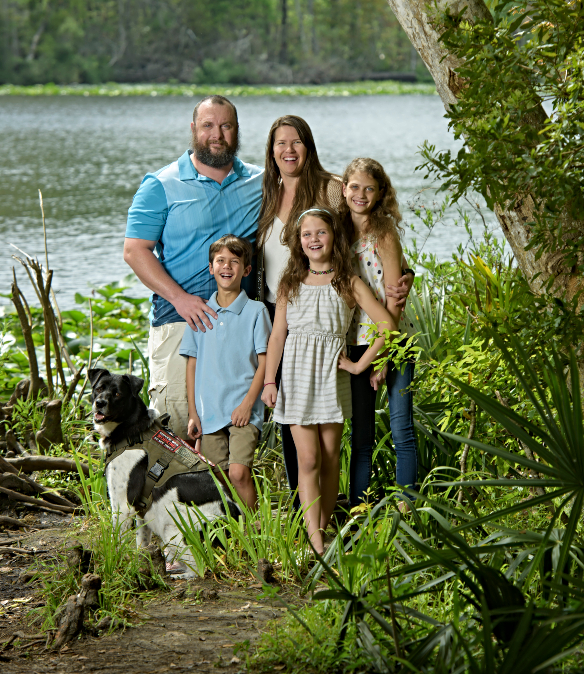From a Heartbreaking Homecoming to a Bright Future: How a Navy Family Fought to Stay Together

For many active-duty service members and spouses, long-anticipated homecomings can become heartbreaking. For Jenna Malone, the stakes to save her marriage were high after her husband, Issac, a U.S. Navy veteran, returned home from Afghanistan with post-traumatic stress disorder (PTSD), traumatic brain injury (TBI), and broken vertebrae. Jenna was determined to save his life, save the relationship, and protect their children. In the process, Jenna also reclaimed her own life.
“With each deployment, my husband Issac experienced more isolation, anger, and physical pain,” Jenna recalled. When Issac tried to take his own life, Jenna sought help first from the Department of Veterans Affairs (VA) and then from Wounded Warrior Project® (WWP).
With Jenna’s encouragement, Issac tried several forms of therapy, but it wasn’t until WWP sent the couple to UCLA’s Operation Mend, part of WWP’s Warrior Care Network®, that things turned around for both of them.
Through their journey, Issac has come to appreciate Jenna’s unconditional support and her diligence in prioritizing mental health. “To have me by his side, still pushing and fighting for him, I think that has meant a lot to him,” Jenna said.
A Happy Beginning to Life’s Ups and Downs
Jenna met Issac while they were both working at a golf course in Pennsylvania and a few weeks before he went to boot camp. She was bartending while in college, and he was teaching golf lessons and working in the golf pro shop.

They fell in love, and obstacles disappeared. Jenna moved cross country to San Diego, where Issac was training. Soon after, Issac proposed, and they embarked on married life. Jenna continued her college classes, focusing on physical fitness, while Issac prepared to deploy to Iraq.
Love in the Time of PTSD
The first time Issac returned home, he was physically unharmed, but Jenna noticed slight changes in his attitude toward others.
It wasn’t until a year after returning from his second deployment in Afghanistan, that things clicked for Jenna. She realized Issac was battling PTSD, although by then, he was getting ready for this third deployment to Japan.
While he was serving in Japan, doctors realized Issac needed urgent surgery due to undetected broken vertebrae in his back. He was sent back stateside, and after his surgery, the physical pain and the PTSD symptoms created a perfect storm of suffering. It seemed like Jenna and Issac’s life together was slipping through their fingers.
The suffering reached its peak when Jenna found her husband with a gun to his head.
Jenna struggled to find help for Issac while feeling the effects of his PTSD.
It took this suicide attempt for Jenna and Issac to realize the weight PTSD had on their relationship.
Thinking back, it was also a time of overwhelming change for the Malone family. Jenna had been working at a gym. She was also caring for their three children, who were 5 and younger at the time, and spending more time in a caregiver role for her husband after the back surgeries affected his mobility.
At this time, Jenna felt alone. They had moved to Virginia and then to Florida and didn’t yet know other veteran families. Jenna stepped down from a management role at the gym and reduced the number of fitness classes she was teaching. She spent more time caregiving at home and was able to access self-care through the VA’s caregiver program. It was the VA staff who suggested Jenna contact a veterans service organization, which led her to WWP.
Caring for the Caregiver
Participating in WWP’s caregiver workshops gave Jenna a sense of belonging: “Everybody clicked, and we all just had this unspoken understanding of each other and what we were facing. The experience of connecting and knowing that you’re not alone made it amazing.”
Jenna made a fast friend and has continued attending connection events through WWP. She also brought the children to family events, and eventually, Issac started to join them.
During this time, Jenna became aware that she had secondary PTSD symptoms.
“I was starting to get triggered even when I was not with Issac,” Jenna said. “I reacted to things that he would react to; for example, a large crowd or loud noises, and I felt hypervigilant in my surroundings.”
At first, she didn’t realize the impact of PTSD on military spouses and that secondary PTSD is common in military families. Secondary PTSD symptoms — or indirect trauma — can be very similar to what warriors with PTSD face: anxiety, depression, irritation, social isolation, and other symptoms.
Eventually, Jenna’s secondary PTSD escalated into panic attacks. She scheduled help via WWP Talk, a free nonclinical, telephonic, emotional support, and goal-setting program. The program assists both warriors and family members. During weekly emotional support calls, participants work one on one with a dedicated WWP Talk partner.

“[WWP Talk] was extremely helpful, especially when it was difficult for me to do in-person counseling,” Jenna said. “I know WWP Talk is not counseling, but it was great for me just to talk out some of the things that I just needed to get off my chest or just work through.”
Issac started to see positive changes in Jenna and realized that help for both of them was within reach. While attending a WWP connection event, they happened to learn about Warrior Care Network®.
“[Warrior Care Network] really changed our lives,” Jenna said.
Caring for the Warrior and Fostering Understanding
Warrior Care Network benefits warriors and caregivers and is accessible to both at no cost. It is an outpatient treatment program that provides world-class care from four academic medical centers around the country. The care is customized to each individual.
“I can’t imagine how my husband had felt,” Jenna said. “To feel like you’re so stuck and nothing’s working. I was willing to do whatever it took to get my husband back.”
“At Warrior Care Network, [Issac] made a lot of progress seeing a dedicated counselor one on one,” Jenna recalled. “I started to see the light turn back on in my husband’s eyes. He was getting more energy and was getting into the routine.”
Jenna and Issac also had access to a marriage counselor daily during the program. They talked about the emotional and practical aspects of their relationship and how to navigate challenges.
Equine therapy was part of the couple’s in-person care as well.
“We actually had a donkey that was very stubborn,” Jenna said. “We negotiated relationship-building obstacles with the donkey. The donkey would not move if we were not on the same page or were not communicating well.”
Warrior Care Network provided follow-up care for a whole year after completing the in-person portion. WWP also connected Jenna and her family to equine therapy at home.
“Our relationship really turned a corner after attending Warrior Care Network,” Jenna said. We learned tools to better communicate through this “new normal” with Issac’s invisible injuries. I also had a better understanding of what he was dealing with on a daily basis and why sometimes he could not engage until his symptoms were more stable.
“I think our kids noticed the difference in how we were interacting with each other and also individually toward them.”
Forging a New, Bright Future
WWP helped Jenna, Issac, and their children find the resources to build a future together.
“I definitely feel like I’m in a much better place emotionally and also as a person finding my own identity,” Jenna said. “I feel that Wounded Warrior Project has helped me find resources to focus on my self-care, which was something I neglected in the past.
“As far as caregiving, it has empowered me to find the resources to help Issac, to help us as a couple, and to help the family. Wounded Warrior Project has really provided a compass to direct ourselves in this new chapter of our lives.”
Jenna is currently finishing a bachelor’s degree in human services. She expects to graduate in May 2024 and then plans to get her master’s in composition. She loves to write and is planning to go into publishing. In addition, she has launched a nonprofit called The Refuge Family to provide whole-health services to caregivers.
“I am excited to turn my pain into purpose and help other caregivers on this journey,” Jenna said. “Our mission is to help those struggling with the storms of life find refuge and rest. We want to empower other wounded warrior families and families of loved ones with disabilities or terminal and chronic illnesses.”
Learn more about how veterans and caregivers are living full lives and helping others #CombatStigma.
Find out how to register and request assistance via WWP programs, including WWP Talk and Warrior Care Network.
Contact: Kaitlin Fohlin — Public Relations, kfohlin@woundedwarriorproject.org, 904.776.7169
About Wounded Warrior Project
Since 2003, Wounded Warrior Project® (WWP) has been meeting the growing needs of warriors, their families, and caregivers — helping them achieve their highest ambition. Learn more.